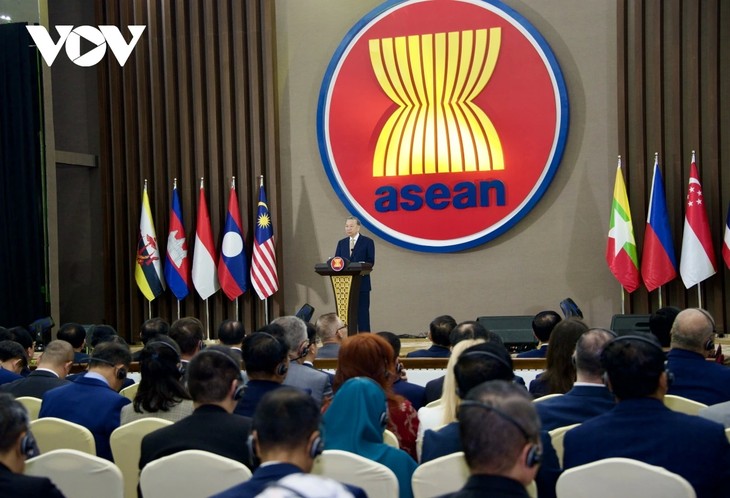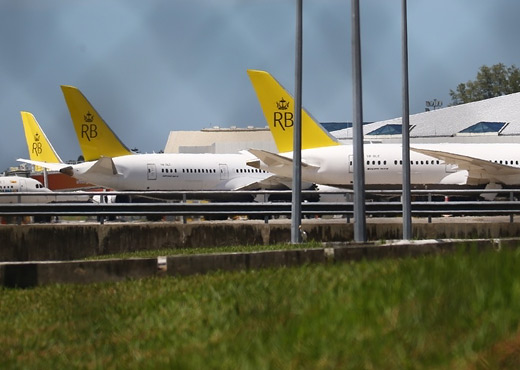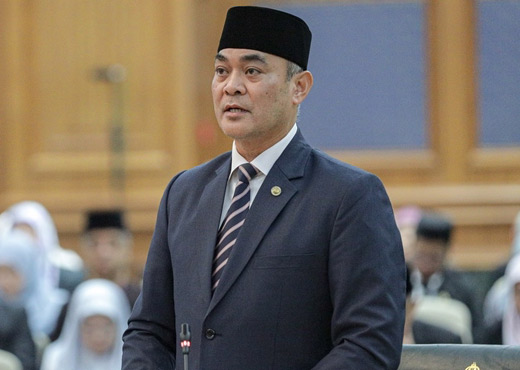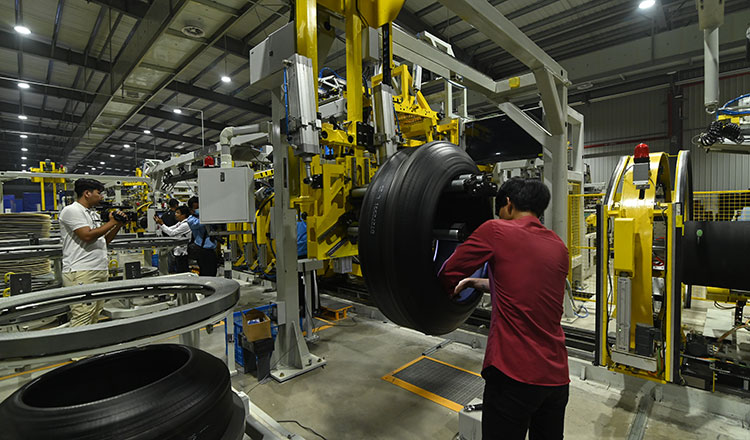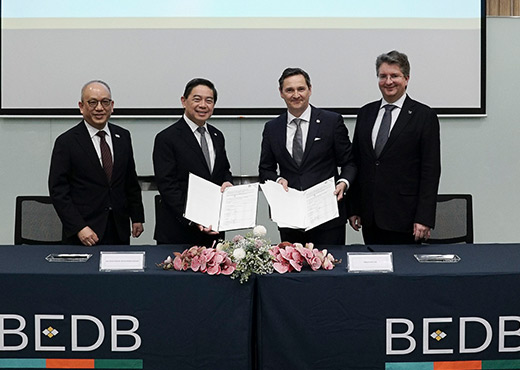National Digital Payment Network (ndpx) today launched tarus, enabling Brunei’s first instant fund transfers across participating banks and e-wallets.
Five platforms have on boarded onto tarus: BEEP Solutions, BIBD At-Tamwil’s Olive, MyDST, TAIBVX, and Progresif’s Ding!.
Users of these applications who have linked their bank accounts, cards, or other forms of credit can now send and receive money across these platforms by entering phone numbers associated with their accounts.
In a press statement, ndpx said Baiduri, BIBD, and ThreeG Media’s Pocket are expected to join in the next phase.
Tarus is the product name of Brunei’s first instant digital payment hub, operating as a back-end infrastructure for instant transfers between participating banks and e-wallets.
Users access tarus through their respective banks and e-wallet providers. The tarus option will appear as an inter-platform transfer option within participating providers.
“Currently, most users in Brunei transfer money within the same bank or e-wallet. While interbank transfers are possible, they primarily rely on systems like the Real-Time Gross Settlement (RTGS) System, which is designed for large-value payments,” said ndpx in their announcement.
Source: Biz Brunei
Read the full article here
The government will establish a securities exchange, clearing house, and central securities depository, marking a significant milestone in Brunei’s financial development, Dato Dr Hj Mohd Amin Liew Abdullah said during a meeting of the Legislative Council.
Preparations are already underway for the launch of the stock exchange, which includes refining the organisational structure, establishing Syariah governance and sukuk listings, and setting out procedures for companies to apply for licences to operate within the exchange.
The feasibility study focused on formulating a detailed plan for building the market ecosystem, regulatory reforms, Syariah governance, cost-benefit analysis, and revenue projections.
A market outreach plan was also devised to engage key stakeholders, including regulators, market participants, potential issuers, and investors; with the objective of ensuring broad participation and support for the exchange.
Source: The Scoop
Read the full article here
BANDAR SERI BEGAWAN (Xinhua) – The Immigration and National Registration Department of Brunei Darussalam announced on Thursday that starting from March 8, Chinese nationals holding ordinary passports will enter the country visa-free. According to the department, citizens of the People’s Republic of China holding a valid ordinary passport with a minimum validity of six months may enter through any designated entry point and stay in Brunei without requiring a visa for a period not exceeding 14 days.
Brunei looked forward to welcoming an increase in Chinese tourist arrivals that will contribute to fostering mutual understanding and stronger people-to-people ties, according to a joint statement issued by the two countries in February 2025.
Source: Borneo Bulletin
Read the full article here
BANDAR SERI BEGAWAN – Brunei has recorded its fastest annual gross domestic product (GDP) growth in 25 years, outperforming expectations with an expansion of 4.2% in 2024 despite ending the year with a quarterly contraction.
Buoyed by robust growth in the downstream oil and gas sector, the Brunei economy delivered its best performance since 1999 when real GDP grew 4.3%.
This also marks the second consecutive year of positive growth, following a 1.4% increase in 2023.
The Brunei economy had suffered a two-year recession from 2021 amid the COVID-19 pandemic, before rebounding in 2023.
In the annual GDP 2024 report released earlier this week, the Department of Economic Planning and Statistics (DEPS) said the oil and gas sector and non-oil and gas sector climbed 5.5% and 3.1% year-on-year, respectively.
Source: The Scoop
Read the full article here
The Brunei Economic Development Board (BEDB), under the Ministry of Finance and Economy (MOFE), is actively working to attract Foreign Direct Investment (FDI) by promoting investment opportunities at regional and international expos. Targeted countries include Japan, South Korea, Australia, Singapore, and India.
This was highlighted by Minister at the Prime Minister’s Office and Minister of Finance II Yang Berhormat Dato Seri Setia Dr Awang Haji Mohd Amin Liew bin Abdullah, in response to a question raised by Yang Berhormat Pehin Orang Kaya Laila Setia Dato Seri Setia Awang Haji Abd Rahman bin Haji Ibrahim during the 9th day of the 21st Legislative Council meeting Tuesday.
To ensure that local entrepreneurs benefit from FDI, including opportunities in the supply chain, BEDB has consistently promoted these prospects. This initiative specifically encourages local MSMEs (Micro, Small, and Medium Enterprises) to act as suppliers and vendors for large FDI companies.
Through the DAreLINKS initiative, more than 600 contract opportunities have been made available to local businesses.
Notably, the downstream oil and gas sector has generated significant positive spin-off effects. For example, Hengyi Industries Sdn Bhd’s operations have benefited from services and supplies provided by 121 local companies, Brunei Fertilizer Industries (BFI) by 230 companies, and Brunei Methanol Company (BMC) by 32 companies.
Source: Borneo Bulletin
Read the full article here
Brunei Darussalam has introduced a Long-Term Pass (LTP) policy to attract foreign investment and skilled professionals, ensuring a more business-friendly environment.
Minister of Home Affairs Yang Berhormat Dato Seri Setia Awang Haji Ahmaddin bin Haji Abdul Rahman announced the initiative during the 21st Legislative Council (LegCo) Session on Tuesday.
Effective December 31, 2024, the LTP allows eligible foreigners to reside in Brunei for up to five years with a multiple-entry visa. It applies to three categories:
Long-Term Social Visit Pass – For foreigners with family ties to Brunei citizens and permanent residents who do not yet qualify for permanent residency.
Long-Term Professional Visit Pass – For foreign experts in fields where Brunei lacks skilled professionals, based on government assessments.
Source: Borneo Bulletin
Read the full article here
The Cambodian government is prioritizing the diversification of its industrial sector by transitioning from labour-intensive industries to knowledge-based and high-tech industries. With a 15.7 percent export growth in 2024, the government is positioning Cambodia as a regional production hub.
The economy is projected to achieve a growth rate of approximately 6 percent of GDP in 2024 and around 6.3 percent in 2025, as outlined in the medium-term public finance framework. The industrial sector remains a key driver, contributing about 8.5 percent to economic growth in 2024 and is projected to expand by approximately 8.6 percent in 2025.
Speaking at the closing ceremony of the Annual Review 2024 and 2025 Planning Conference of the Ministry of Industry, Science, Technology & Innovation (MISTI) on Wednesday, Permanent Deputy Prime Minister Vongsey Vissoth, who also serves as the Minister in Charge of the Office of the Council of Ministers, highlighted Cambodia’s increasing economic diversification over the past decade.
He noted that the Kingdom has established more trading partnerships and attracted increasing investments in high-value sectors beyond the garment industry, such as electronic component manufacturing and automobile assembly. As a result, both garment and non-garment manufacturing have become the largest contributors to the country’s economic growth.
“Exports in 2024 grew by 15.7 percent and more Cambodian products are entering regional and international markets,” he said. “In the medium and long-term development process, Cambodia must strengthen and accelerate the development of its industrial sector and adapt and diversify the economic structure and base that have supported growth for more than two decades to suit the current socio-economic situation, so that it can continue to sustain high growth in the long term and become more resilient.”
For full article, please read here
Source: Khmer Times
The Brunei Economic Development Board (BEDB) and Tipolis Pte Ltd, a Singapore-based developer of next-generation special economic zones, have signed an agreement on February 25, 2025 to assess the feasibility of a potential joint project in Brunei.
The agreement initiates the specific feasibility study and contract negotiations, aligning with Brunei’s diversification efforts under its national vision Wawasan 2035.
The signing ceremony took place at the main auditorium of the Design and Technology building in Anggerek Desa.
Source: Biz Brunei
Read the full article here


